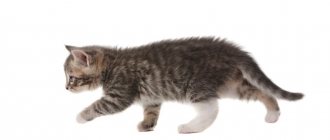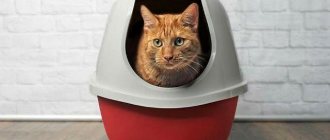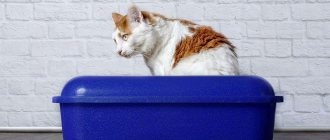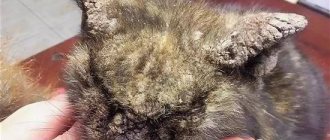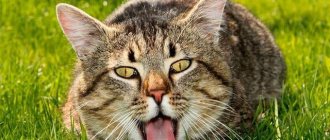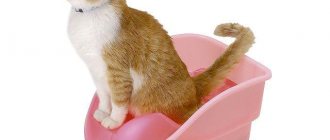Cats are often constipated. It is usually mild and you can help your cat's constipation with simple home remedies.
But sometimes constipation in cats can indicate a more serious health problem, and it can become very serious and unpleasant. So how do you know if it's a serious problem that requires your veterinarian's attention?
Here's what you need to know about the symptoms and causes of constipation in cats, what you can do to help your cat, and when to worry.
Causes of constipation in a kitten
Constipation is a problem that some pets face. Delayed defecation occurs in babies, in particular in kittens. This phenomenon is unpleasant, and in some cases very dangerous. Therefore, measures must be taken immediately.
The answer to the question of what exactly needs to be done when a small kitten is constipated depends on the reasons that caused the malfunction in the body. There may be several of them.
Most common
Most often, defecation delay occurs due to digestive problems. Moreover, in kittens from birth to 3 months, various phenomena can affect intestinal function.
Kittens are born blind and deaf, and therefore in the first weeks of life they cannot do without their mother: she pushes them to the nipples and licks their tummy and places near the genitals. The last point is a very important point. Babies cannot go to the toilet on their own, and therefore the cat stimulates bowel and bladder emptying with a massage.
The second important point is that the microflora in the gastrointestinal tract of kittens appears when they feed first on colostrum and then on mother’s milk. For this reason, constipation in a newborn kitten can cause the baby to be switched to artificial nutrition due to the fact that the cat stops feeding the cubs (there are different reasons) or she does not have enough milk.
It’s a different matter when it comes to constipation in a kitten who is 1 month old or a little older - at this age the baby usually begins to supplement its feeding, which makes its intestines more vulnerable. The predominance of protein in the diet or lack of water, especially when dry food is introduced, low-quality industrial food - these and other phenomena cause the kitten to not be able to go to the toilet normally.
Closer to 2-3 months, a problem such as the presence of a foreign body or a hairball in the kitten’s intestines is added - they form a kind of plug, which leads to constipation. Foreign bodies are often small balls, buttons or pieces of cellophane. Kittens swallow them while playing or out of curiosity. Most often, hairballs appear in the stomach and intestines of babies of long-haired breeds.
Another common cause of constipation in kittens is a sedentary lifestyle. These animals need to constantly run, jump and play. Passivity leads to deterioration of intestinal motility and, as a consequence, constipation.
Kittens, like any living creature, can experience stress due to being separated from their mother, a change in environment, and the presence of unfamiliar people or animals nearby. And this is another reason for disruptions in the body.
A dirty litter tray also leads to constipation. Some kittens, already at an early age, refuse to go to the toilet if the owner did not have time (or did not want) to remove traces of the baby’s previous visit to the litter box. Therefore, pets retain feces - this is also typical for animals. This phenomenon, if repeated regularly, eventually turns into a problem.
When does Duphalac start to work?
This medicine is not an instant-acting medicine. It works gently without disturbing your overall well-being. For minor digestive disorders, the effect occurs within 4–8 hours. For persistent constipation, relief may take 1 to 3 days.
Positive signs:
- reducing the feeling of heaviness in the intestines;
- disappearance of spasms;
- softening of stool;
- defecation without difficulty.
Possible serious pathologies
There are also more serious causes of constipation in kittens. Here are the most common ones:
- Worm infestation. The disease is serious and requires surgical intervention by a specialist, since parasites can seriously undermine the baby’s health. One of the signs by which you can determine that a kitten has worms is that its body becomes like a pear. It is not recommended to give parasite medications to your pet on your own. Here you need to consult a specialist: he will determine the type of parasites, select the appropriate drug and give recommendations on dosage.
- Neoplasms in the intestines. Tumors, polyps and other growths on the walls of the intestines lead to narrowing, and in the most serious cases, to complete blockage of the lumens. As a result, feces simply cannot move further and accumulate in the intestines.
- Injury to the intestinal walls. Often the cause is the ingestion of seeds with sharp edges.
You will not be able to cope with these problems on your own. Only a specialist can make a diagnosis and decide on therapy after conducting the necessary examinations.
What is Duphalac used for?
The probiotic contained in the medicine stimulates intestinal peristalsis, increases the volume of feces and affects the metabolism of minerals: phosphorus, nitrogen salts and calcium. As a result, the absorption of toxic substances is reduced, internal microflora is normalized and defecation is facilitated.
Duphalac is indicated to eliminate intestinal dysfunction:
- acute and chronic constipation;
- slowing down the physiological emptying of the colon;
- excessively dense feces;
- various types of intestinal dysbacteriosis;
- dyspeptic syndrome;
- increased fermentation process;
- acute symptoms of hemorrhoids;
- hepatic encephalopathy and stool disorders caused by it
In some cases, Duphalac is used to prevent complications and to cleanse the intestinal lumen before abdominal surgery.
Clinical symptoms
Before deciding what to do with a kitten in the first weeks of life, at 1 month, or with an older cat, you need to make sure that he really is constipated. After all, sometimes defecation once every 2-3 days can simply be a feature of the body.
Some tips on how to tell if your kitten is constipated:
- The baby doesn't go to the toilet for three days. Sometimes he has difficulty squeezing out some hard and dry feces in the form of small peas.
- The kitten sits in the tray for a long time in the appropriate position, as it cannot empty its intestines and meows loudly. The feces contain blood and mucus.
- The small pet becomes passive and apathetic and periodically makes alarming sounds. His appetite disappears or decreases. Vomiting (or frequent urge to do so) often occurs.
- The kitten's tummy becomes enlarged and tense. Touching it causes pain or discomfort in the baby.
If the pet is not helped in time, he begins to lose weight and experience fear of the litter box. The most serious consequences are intoxication of the body, intestinal ruptures and even death.
Laxatives: Top 5
- Medicines based on lactulose (“Dufolak”, “Romphalak”, “Gudalak”). The drugs can be used for a long time, the drugs are suitable for animals, have a gentle effect on intestinal motility, and are safe for health. Bowel movement occurs within 2-3 hours, taken in the morning and evening, single dose – 0.5 mg per kilogram of weight.
- Magnesium sulfate solution. The product acts on receptors in the walls of the gastrointestinal tract, effectiveness is achieved after 7-10 hours. single dose – 2-4 mg.
- “Ramnil” is a medicine made from buckthorn bark. The drug in tablet form is given to the animal once a day. A single dose is half a tablet.
- Carlsbad salt solution. The product helps improve digestion processes and leads to gentle bowel movements. Dilute a tablespoon of powder in 100 ml of water and give to the cat 2 times a day.
- “Izafenin”. Taking the powder helps cope with chronic constipation and is used as prescribed by a veterinarian.
First aid at home
Any malfunctions in the pet’s body should be a reason to go to the veterinary clinic. But in some cases, the owner is able to provide first aid to a constipated kitten at home. You just need to remember that the baby’s body is still quite fragile, and therefore you need to act very carefully.
Here are some options for what to do if your kitten is constipated before visiting the vet:
- A newborn baby who is left without a mother will most likely benefit from stimulation of the digestive process. To do this, you need to imitate the actions of a cat: moisten a cotton pad in warm water and give it a light massage of the tummy and areas near the genitals. If constipation is caused by changes in diet, this may be enough to make the baby poop.
- If the pet is older and is given dry food, you need to make sure that the kitten drinks more water. If the pet refuses to do this on its own, you need to periodically bring it to the bowl and tilt its muzzle towards it.
- Foods that cause constipation should be excluded from the diet of a kitten aged 2 months and older.
- Get your baby, who prefers to spend most of his time on the couch, to move. Balls or joint games will help with this.
Even an inexperienced owner can provide such assistance to a kitten. It is important that such actions will definitely not harm the small pet. If you suspect the presence of a foreign object, worms or intoxication in the intestines, it is better not to take risks, but try to immediately show the baby to the veterinarian.
Who is Duphalac contraindicated for?
Treatment with the drug is excluded:
- in case of individual intolerance to components;
- rectal and other internal bleeding;
- intestinal obstruction;
- acute pain syndrome of unknown origin;
- suspected development of appendicitis;
- galactosemia.
The medicine is used with caution in cases of carbohydrate metabolism disorders and diabetes mellitus.
Professional veterinary care
The following activities require more experience with animals. And some of them are not at all advisable for an owner who has never encountered anything like this before. The best option is to talk to a veterinarian who will examine the kitten, give recommendations for further therapy and tell you how not to harm the baby.
Professional assistance includes the following:
- Abdominal massage. Somewhat reminiscent of the one they make for small children. These are circular stroking movements with your hand, which should start the work of the gastrointestinal tract. Massage will help your kitten if constipation is caused by poor diet, stress, or a small foreign body that can come out naturally.
- Duphalac, Lactusan and other similar lactulose-based drugs. They are prescribed for constipation in newborn children, and in the case of animals they will also be safe and effective. The drugs can be given to a pet who is several weeks old if he has been transferred to artificial feeding. The dose is selected taking into account the weight of the kitten.
- Vaseline oil. To some extent, a universal product: it can be dropped into the kitten’s mouth or added to food when taking emergency measures, as well as for prevention. Vaseline oil is often used in an enema. The product is not absorbed into the blood and intestines. When it enters the gastrointestinal tract, it envelops the intestinal walls with a film and covers feces, making them softer and faster out of the body. Usually the kitten is allowed to give Vaseline oil 2-3 times a day. It is better to discuss the permissible amount with your veterinarian.
- Soap in the form of a small candle. It is inserted into the kitten's anus if there are no signs that it is inflamed. A side effect when providing assistance in this way is sometimes an allergy to the composition of the soap, so it is recommended to choose only children's soap.
- Enema. To carry out the procedure, you can use a small bulb or a 10 mm syringe without a needle. Pure water or chamomile solution are suitable as a solution. The tip must be lubricated with greasy cream or Vaseline oil. The liquid is administered through the anus very carefully - the pet should be in a standing position over a tray or other container. It is undesirable to carry out the procedure yourself if the owner has never seen how it is done. The reason is that if you introduce a lot of liquid, the intestinal walls can burst, and this is fraught with more serious problems than constipation. An enema is also dangerous if there are neoplasms, foreign objects and wounds in the gastrointestinal tract. Typically, the cleansing procedure is carried out by a veterinarian after the cause of constipation has been determined.
The specialist determines the cause of constipation in a week-old, month-old or older kitten, and also decides what to do next after taking a full history. It includes:
- conversation with the owner;
- blood, urine and stool tests;
- X-ray with contrast agent:
- Ultrasound of the abdominal cavity.
In some cases, an MRI is performed - the procedure allows you to confirm or refute the suspicion of oncology.
Based on the results of the examinations, treatment is selected for the kitten. Sometimes it involves an enema, an IV with a maintenance drug, and surgical removal of a foreign object. After visiting the veterinarian and receiving recommendations, you must strictly follow all instructions to prevent complications of the disease. It is very important to complete treatment, including when it seems that your pet is no longer constipated.
Folk remedies
Effective folk remedies to relieve your cat of constipation:
Condensed milk. This remedy has a laxative effect and is safe. You will need to mix condensed milk and boiled water in equal proportions. A total of 150 ml of the mixture is needed, which should be given to the cat on an empty stomach or 1 hour after eating. There is no need to force your pet to take such a folk medicine, since animals drink this liquid with pleasure. It is enough to give the mixture once. The effect will be noticeable within a few hours. Vaseline oil. This product helps soften feces and also speeds up their evacuation from the intestines. A single dose is 0.5 ml. The oil should be given 2 times a day an hour after meals. The course of treatment should not exceed a day. Vegetable oil. To relieve constipation, you can add this product to liquid food. However, the main thing is not to overdo it, since vegetable oil is harmful to the cat’s liver. 2-3 drops once is enough. The laxative effect will manifest itself after 5–6 hours. Pumpkin. This product is considered one of the safest for pets. It is necessary to steam the pumpkin properly and add the pulp to the liquid food
It is important to mix everything thoroughly so that the cat cannot sense the presence of the vegetable. For 2 st.
l. 2 tsp of feed is enough. pumpkins. You need to mix the vegetable every day for a week. The stool should return to normal within 5–6 days. Licorice rhizome. 1 tsp. raw materials need to be poured with 200 ml of boiling water and allowed to brew for an hour. Then filter and give your pet 20 ml 2 times a day before meals for three days.
Ingredients for traditional medicine recipes - photo gallery
Condensed milk with water has a laxative effect
Licorice rhizomes stimulate intestinal function Pumpkin pulp helps improve intestinal motility Vegetable oil softens feces, promoting their movement through the intestines
Can complications occur?
One of the serious consequences of not treating constipation in a kitten is the transition of the disease to the chronic stage. This means that your pet will continue to have problems with bowel movements in the future: for example, from time to time he may have difficulty going to the toilet or his intestines will be partially emptied. This means that intoxication of the body will continue. Its manifestation is a noticeable decrease in activity, appetite and weight and frequent nausea.
Disease prevention
Preventive measures help eliminate problems with the gastrointestinal tract and constipation in kittens. It's not difficult to follow them. Here is what you need to do if your pet has had or periodically experiences constipation:
- Provide the kitten with quality food. You need to choose premium food and combine dry food with wet and canned food. Make sure your pet always has clean water in sufficient quantities. When eating natural foods, it is necessary to exclude from the diet foods that cause constipation.
- Make sure the tray is always clean.
- Organize outdoor games so that the kitten moves more.
- Brush your pet regularly. This will reduce the amount of hair your kitten ingests when licking itself.
- Get massages. To do this, you do not need to take any special actions. It is enough to stroke the kitten's tummy when it climbs onto your lap.
- In consultation with the veterinarian, give your pet Vaseline oil (it is important to follow the recommended dose).
Thus, constipation in a kitten is not as harmless a phenomenon as it might seem at first glance. Like any other malfunction in the body, it requires prompt action. And the best reward for the owner will be a healthy and cheerful pet.
Enema
The use of a rectal enema with an oily product is acceptable in kittens and adult cats.
The product is used pure or diluted with water. After adding the product to the water, the solution should be shaken well and brought to a temperature of approximately 25-30 degrees. Hot or very cold liquid will cause discomfort to your pet.
The amount of solution is determined depending on the age and size of the animal:
- Vaseline oil for kittens is administered with a pipette. Usually 2 pipettes with a solution or 1 ml of pure substance are enough to obtain the effect. After giving the enema, veterinarians recommend helping the baby: giving a light tummy massage.
- For adult pets, a dosage of 5-12 ml of pure product or 250 ml of solution helps induce defecation.
To administer an enema, use a syringe (bulb) or a hose from an IV and a syringe. The tip of the device must be lubricated with cream and carefully inserted into the anus. The fluid is introduced slowly so as not to damage the rectum or cause pain.
The tip is also carefully removed from the rectum. If the enema does not work or black stool comes out (a sign of intestinal bleeding), you should consult a doctor as soon as possible.
Symptoms of the problem
If your pet begins to visit the litter box less often than usual, watch him. For behavioral reasons associated with stale filler, it will regularly make piles in the wrong place. Don't scold your pet for this and change the tray more often. Clean animals rarely walk past their toilet. When an unpleasant odor appears, they can meow loudly, calling on the owner to solve the problem. Be attentive to such situations.
A serious pathology can be indicated when accompanying symptoms appear, including:
- painful and swollen abdomen;
- vomit;
- temperature increase;
- depression and refusal to eat;
- prolonged stay in the tray, accompanied by plaintive meowing;
- mucus or blood in the stool, changes in its color and consistency;
- the presence of blood on the anus or its swelling caused by trauma to the rectum.
The absence of bowel movements, followed by periodic diarrhea, is a sign of enterocolitis, that is, simultaneous inflammation in the small intestine and rectum. Only a doctor can make an accurate diagnosis. After detecting the listed symptoms, be sure to make an appointment with a veterinary clinic.
Methods for solving the problem
If problems with constipation are so serious that your pet is already meowing pitifully, vomiting, or lying down exhausted, you should immediately consult a veterinarian. He will conduct the necessary examinations, give the animal an enema, a drip to eliminate dehydration, and possibly carry out other medical procedures. When everything is not so scary, you can fight the causes and symptoms of a cat’s intestinal obstruction at home.
Balance your diet
Modern fluffies often fall victim to the busyness of their owners, who give them industrially produced food - dry or canned. In both cases, food is not able to replace the classic mouse with its protein muscles, plant debris in the stomach and hair with bones. Store-bought food is high in carbohydrates (dry), low in fiber and dietary fiber (canned), and low in vitamins. Food from the master's table, transferred to the cat's bowl, does not save the situation.
Therefore, if a cat has constipation, we recommend saturating his menu with natural raw proteins, living vitamins (sprouted oats on the windowsill) and dietary fiber. This is grated raw carrots, pumpkin, cabbage, zucchini or bran. Cereals, such as oatmeal, are suitable as a base for soups or porridges. Don’t forget to also pamper your pet with yogurt and kefir from time to time.
Look after the fur
The accumulation of hair in the intestines is a problem that is typical primarily for long-haired cats. If your cat doesn't eat plant fibers, it can lead to constipation. Caring owners comb such pets daily, during the molting period - up to two or three times a day. Also, to remove hair as a preventive measure, it is necessary to give a special paste, for example, Cliny or Malt-Soft.
The easiest way to help your cat remove the fur that has already entered the intestines is to sow wheat, oats or rye on the windowsill. As soon as the grass comes up, it will purr - rest assured! - will begin to graze on it, thereby preventing problems with stool.
Give laxatives
If your cat has not been able to go to the litter box for several days, treat her with a mild laxative. It could be kefir, condensed milk half and half with water. Some people add a few drops of vegetable oil to the food.
Do an enema
When preventive measures have not given a positive result and the cat cannot go to the toilet, you will have to give him an enema with boiled water cooled to room temperature. You can add potassium permanganate or Vaseline oil there. This method, of course, is nerve-wracking - both for you and for the animal - but when carried out correctly it immediately provides relief. Since there is a danger of injuring the purr during an enema, it is better to consult a veterinarian.
